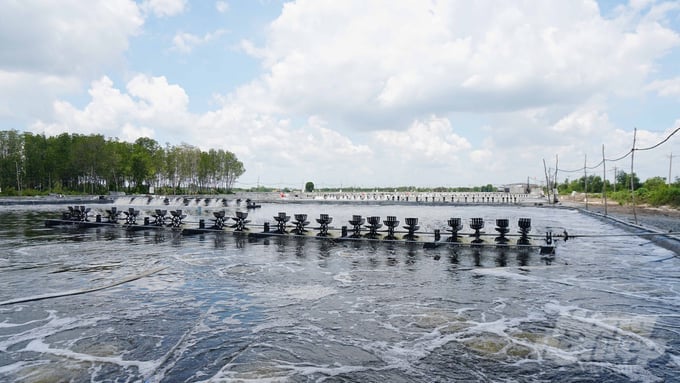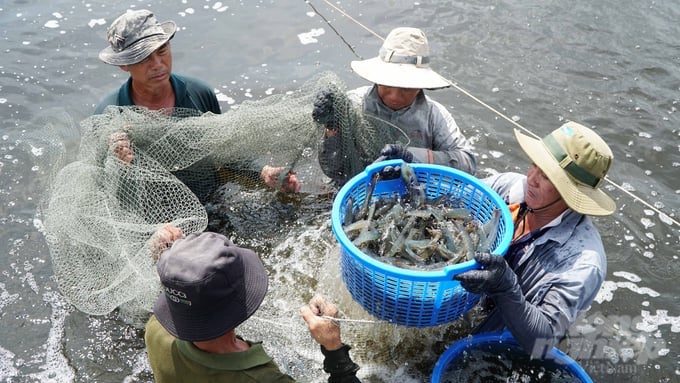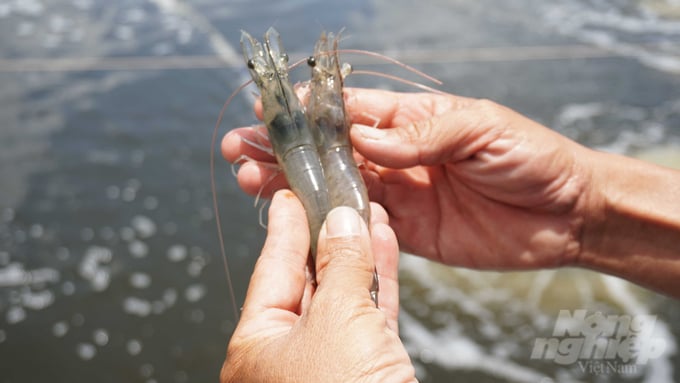June 17, 2025 | 11:47 GMT +7
June 17, 2025 | 11:47 GMT +7
Hotline: 0913.378.918
June 17, 2025 | 11:47 GMT +7
Hotline: 0913.378.918

Nhon Trach District currently has 171 hectares dedicated to high-tech shrimp farming, providing a substantial economic benefit for the local population. Photo: Le Binh.
One of the most notable features of advanced aquaculture practices in Dong Nai province includes the cultivation of whiteleg shrimp using pond systems equipped with impermeable liners in the Long Thanh and Nhon Trach districts. Nhon Trach district currently houses 171 hectares of high-tech shrimp farming area, with an annual average income of VND 1.5 billion per hectare.
High-tech shrimp farming represents the prevailing developmental trajectory in Dong Nai province. According to Mr. Chau Thanh An, Director of the Dong Nai province's Sub-Department of Fisheries, shrimp farming activities in Nhon Trach district were relatively fragmented and spontaneous in the past. However, local residents have progressively initiated collaborations to engage in large-scale shrimp farming within the last few years.
"This cooperative approach has contributed to streamlined planning, cost savings with regards to shrimp waste management through designated channels and separate water supply systems, thereby ensuring the safety of shrimp farming. Additionally, the collaboration in large farming areas has substantially improved disease control in shrimp farming," Mr. An added.
Traders often visit Mr. Nguyen Huy Binh's 13-hectare shrimp farming area directly, which consists of twenty-five ponds located in Phuoc An commune, Nhon Trach district, to catch and weigh the farmed shrimp. According to Mr. Binh, the adoption of a high-tech shrimp farming model has yielded significant improvements in efficiency.

Many residents in Nhon Trach district have gained significant wealth from high-tech whiteleg shrimp farming. Photo: Le Binh.
The twenty-five shrimp ponds owned by Mr. Binh were transformed from areas contaminated with saltwater intrusion. These ponds are equipped with bottom liners and a fan system. Thanks to the high-tech shrimp farming model, the pond water is treated to achieve a balanced salinity level prior to the introduction of shrimp seeds. As a result, shrimp have a safe environment for growth, and they remain healthy with a low mortality rate.
Mr. Binh plans to invest in a system of dome houses over the ponds to create a stable environment for the shrimp in the near future. Accordingly, the system will help reduce temperature fluctuations between day and night. Additionally, it will prevent rainwater from entering the shrimp ponds during the rainy season, thereby reducing the risk of diseases.
In addition to extensive investments in high-tech shrimp farming, Mr. Binh is also proactive in the linkage of production. As a result, feed and seed supply companies frequently offer him support with animal health staff to monitor and supervise the shrimp farming process, which enhances disease control. Mr. Binh established the Thanh Cong Agricultural and Aquatic Services Cooperative with the aim of promoting production linkage.
"By linking together, the cooperative will consume a large quantity of input materials. As a result, companies provide better support in terms of prices, transportation, seed quality, technical assistance, machinery, personnel, and, most importantly, product quality control, environmental monitoring, and water quality parameters," Mr. Binh explained.
Mr. Nguyen Truong Dai in Vinh Thanh commune, Nhon Trach district has also achieved significant success in shrimp farming using the high-tech CPF-Combine Model. According to Mr. Dai, this technology has simplified the shrimp farming process by eliminating concerns regarding abnormal water level fluctuations or high salinity levels. Accordingly, the average yield per crop reaches 40 tons per hectare. After deducting expenses, there is an annual profit of at least 1.5 to 1.6 billion VND.
This model has been selected by Nhon Trach District People's Committee as a site to develop VietGAP shrimp farming and expand the production-consumption linkage chain.

The application of high technology in shrimp farming helps people minimize the risk of diseases. Photo: Le Binh.
Furthermore, Mr. Dai applies the "5 nos" criteria in order to achieve high efficiency and sustainability in whiteleg shrimp farming, including: No old water, no excessively deep water, no still water, no direct water intake, and no discharge of polluted wastewater into the environment.
According to Mr. Tran Lam Sinh, Deputy Director of Dong Nai province's Department of Agriculture and Rural Development, the risk of shrimp diseases has risen substantially as the number of shrimp ponds increases within the last few years. As a result, the transition from traditional shrimp farming, which carries numerous risks, to high-tech shrimp farming is a necessary trend.
"High-tech shrimp farming grants farmers better control over breeding, disease prevention, feeding, as well as the effective management of pond bottom sediment, thereby ensuring a healthy aquatic environment. Most importantly, high-tech shrimp farming is significantly more profitable compared to traditional methods," Mr. Sinh shared.
Translated by Nguyen Hai Long

(VAN) A cutting-edge farming technique being implemented on an experimental ranch in Arizona's Sonoran Desert has already saved a billion gallons of water over five years, according to Civil Eats.

(VAN) Poultry and pig production and the environment can be boosted through enhanced water technology, according to new research.
![Turning wind and rain into action: [4] Bringing climate bulletins to remote and isolated areas](https://t.ex-cdn.com/nongnghiepmoitruong.vn/608w/files/linhnhp/2025/06/14/1152-z6704423696987_15fd32ffc26d590d204d520c9dac6786-nongnghiep-151141.jpg)
(VAN) The Vietnam Agriculture and Nature Newspaper interviewed Mr. Vu Thai Truong, Acting Head of Climate Change and Environment at UNDP Vietnam, to gain deeper insight into how climate bulletins are delivered to farmers.

(VAN) In Tien Giang, a high-tech shrimp farm has developed a distinctive energy-saving farming model that has yielded promising results.
![Turning wind and rain into action: [3] 300.000 farmers benefit from agro-climatic bulletins](https://t.ex-cdn.com/nongnghiepmoitruong.vn/608w/files/news/2025/06/12/e5a48259d6a262fc3bb3-nongnghiep-125122.jpg)
(VAN) The agro-climatic bulletin has become a valuable tool for farmers in the Mekong Delta. After more than five years of implementation, the initiative is gradually being expanded nationwide.
![Turning wind and rain into action: [2] Providing forecasts to the people](https://t.ex-cdn.com/nongnghiepmoitruong.vn/608w/files/news/2025/06/12/e5a48259d6a262fc3bb3-nongnghiep-103927.jpg)
(VAN) In addition to improving the quality of hydrometeorological forecasts, putting forecast bulletins into practical use is crucial for production and disaster prevention.

(VAN) Blue carbon is receiving attention for its rapid absorption capacity and vast potential. It represents a promising nature-based solution to respond to climate change.